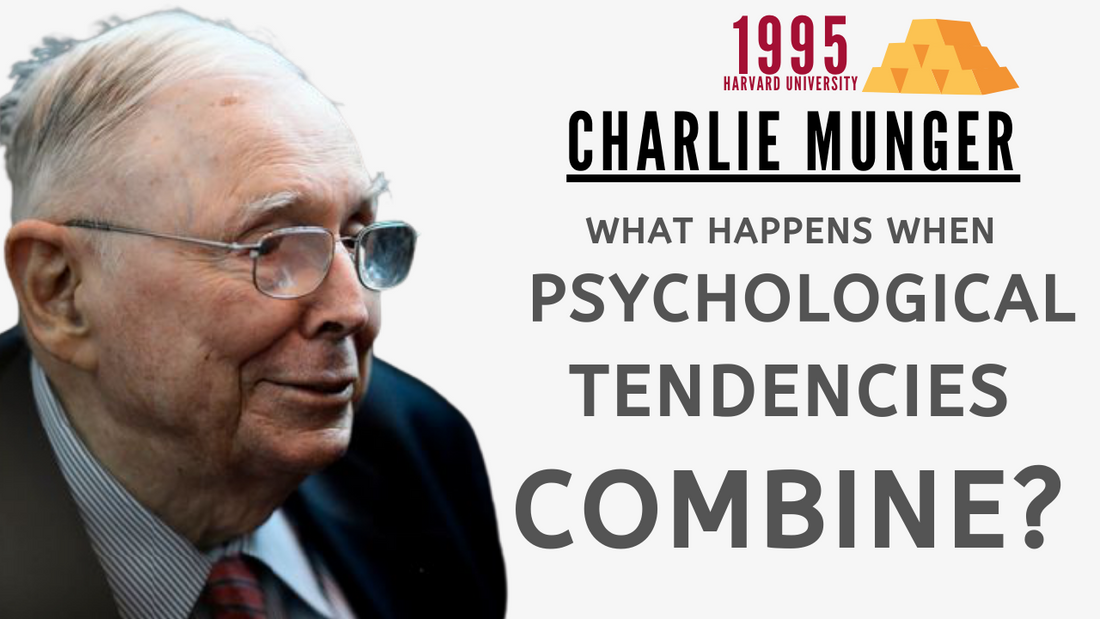
Charlie Munger: Combine Psychological Tendencies. | Harvard University 1995【C:C.M Ep.91】
[Transcript]
CHARLIE MUNGER: Now, the time has come to ask two or three questions. This is the most important question in this whole talk. What happens when these standard psychological tendencies combine? What happens when the situation, or the artful manipulation of man, causes several of these tendencies to operate on a person toward the same end at the same time? The clear answer is the combination greatly increases power to change behavior, compared to the power of merely one tendency acting alone.
Examples are: Tupperware parties. Tupperware has now made billions of dollars out of a few manipulative psychological tricks. It was so schlock that directors of Justin Dart’s company resigned when he crammed it down his board’s throat. And he was totally right, by the way, judged by economic outcomes.
Moonie conversion methods. Boy, do they work. He just combines four or five of these things together. The system of Alcoholics Anonymous. A 50% no-drinking rate outcome when everything else fails? It’s a very clever system that uses four or five psychological systems at once toward, I might say, a very good end.
The Milgrim experiment. See, Milgrim… It’s been widely interpreted as mere obedience, but the truth of the matter is that the experimenter who got the students to give the heavy shocks in Milgrim, he explained why. It was a false explanation. “We need this to look for scientific truth,” and so on. That greatly changed the behavior of the people. And number two, he worked them up, tiny shock, a little larger, a little larger. So commitment and consistency tendency and the contrast principle were both working in favor of this behavior. So again, it’s four different psychological tendencies.
That's when you get these lollapalooza effects you will almost always find four or five of these things working together. When I was young, there was a whodunit hero who always said cherchez la femme. What you should search for in life is the combination, because the combination is likely to do you in. Or, if you’re the inventor of Tupperware parties, it’s likely to make you enormously rich if you can stand shaving when you do it.
One of my favorite cases is the McDonald-Douglas airliner evacuation disaster. The government requires that airliners pass a bunch of tests. One of them is evacuation. Get everybody out, I think it’s 90 seconds or something like that. It’s some short period of time. The government has rules, make it very realistic, so on, and so on. You can’t select nothing but 20-year-old athletes to evacuate your airline.
So McDonald-Douglas schedules one of these things in a hangar, and they make the hangar dark. The concrete floor is 25 feet down, and they got these little rubber chutes, and they got all these old people. They ring the bell, and they all rush out. In the morning when the first test is done, they create, I don’t know, 20 terrible injuries. People go off to hospitals. Of course, they scheduled another one for the afternoon. By the way, they didn’t meet the time schedule either, in addition to causing all the injuries. So what do they do? They do it again in the afternoon. Now, they create 20 more injuries and one case of a severed spinal column with permanent, unfixable paralysis. They’re engineers. These are brilliant people. This is thought over through in a big bureaucracy. Authorities told you to do it. He told you to make it realistic. You’ve decided to do it. You’d decided to do it twice. Incentive-caused bias. If you pass, you save a lot of money. You’ve got to jump this hurdle before you can sell your new airliner.
Again, three, four, five of these things work together, and it turns human brains into mush. And maybe you think this doesn’t happen in picking investments. If so, you’re living in a different world than I am.
Finally, the open-outcry auction. Well, the open-outcry auction is just made to turn the brain into mush. You get social proof. The other guy is bidding. You get reciprocation tendency. You get deprival super-reaction syndrome. The thing is going away. I mean, it just absolutely is designed to manipulate people into idiotic behavior.
Finally, the institution of the board of directors of a major human, American company. Well, the top guy is sitting there. He’s an authority figure. He’s doing asinine things. You look around the board, nobody else is objecting. Social proof, it’s okay. Reciprocation tendency, he’s raising the director’s fees every year. He’s flying you around in the corporate airplane to look at interesting plants, or whatever in hell they do, and you go and you really get extreme dysfunction as a corrective decision-making body in the typical American board of directors. They only act, again the power of incentives, they only act when it gets so bad that it starts making them look foolish, or threatening legal liability to them. That’s Munger’s rule. I mean, there are occasional things that don’t follow Munger’s rule, but by and large the board of directors is a very ineffective corrector if the top guy is a little nuts, which, of course, frequently happens.
(Source: https://youtu.be/07f8oasWqWg)
[YAPSS Takeaway]
